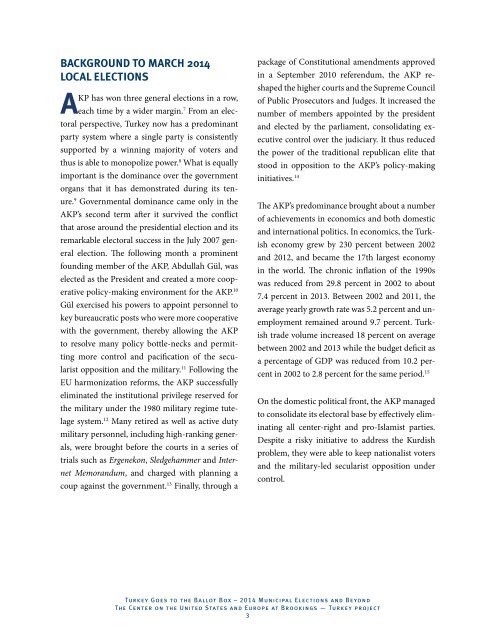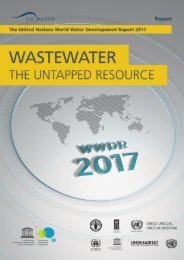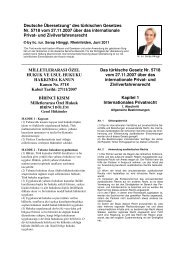13 turkey ballot box municipal elections carkoglu
13 turkey ballot box municipal elections carkoglu
13 turkey ballot box municipal elections carkoglu
You also want an ePaper? Increase the reach of your titles
YUMPU automatically turns print PDFs into web optimized ePapers that Google loves.
Background to March 2014<br />
Local Elections<br />
AKP has won three general <strong>elections</strong> in a row,<br />
each time by a wider margin. 7 From an electoral<br />
perspective, Turkey now has a predominant<br />
party system where a single party is consistently<br />
supported by a winning majority of voters and<br />
thus is able to monopolize power. 8 What is equally<br />
important is the dominance over the government<br />
organs that it has demonstrated during its tenure.<br />
9 Governmental dominance came only in the<br />
AKP’s second term after it survived the conflict<br />
that arose around the presidential election and its<br />
remarkable electoral success in the July 2007 general<br />
election. The following month a prominent<br />
founding member of the AKP, Abdullah Gül, was<br />
elected as the President and created a more cooperative<br />
policy-making environment for the AKP. 10<br />
Gül exercised his powers to appoint personnel to<br />
key bureaucratic posts who were more cooperative<br />
with the government, thereby allowing the AKP<br />
to resolve many policy bottle-necks and permitting<br />
more control and pacification of the secularist<br />
opposition and the military. 11 Following the<br />
EU harmonization reforms, the AKP successfully<br />
eliminated the institutional privilege reserved for<br />
the military under the 1980 military regime tutelage<br />
system. 12 Many retired as well as active duty<br />
military personnel, including high-ranking generals,<br />
were brought before the courts in a series of<br />
trials such as Ergenekon, Sledgehammer and Internet<br />
Memorandum, and charged with planning a<br />
coup against the government. <strong>13</strong> Finally, through a<br />
package of Constitutional amendments approved<br />
in a September 2010 referendum, the AKP reshaped<br />
the higher courts and the Supreme Council<br />
of Public Prosecutors and Judges. It increased the<br />
number of members appointed by the president<br />
and elected by the parliament, consolidating executive<br />
control over the judiciary. It thus reduced<br />
the power of the traditional republican elite that<br />
stood in opposition to the AKP’s policy-making<br />
initiatives. 14<br />
The AKP’s predominance brought about a number<br />
of achievements in economics and both domestic<br />
and international politics. In economics, the Turkish<br />
economy grew by 230 percent between 2002<br />
and 2012, and became the 17th largest economy<br />
in the world. The chronic inflation of the 1990s<br />
was reduced from 29.8 percent in 2002 to about<br />
7.4 percent in 20<strong>13</strong>. Between 2002 and 2011, the<br />
average yearly growth rate was 5.2 percent and unemployment<br />
remained around 9.7 percent. Turkish<br />
trade volume increased 18 percent on average<br />
between 2002 and 20<strong>13</strong> while the budget deficit as<br />
a percentage of GDP was reduced from 10.2 percent<br />
in 2002 to 2.8 percent for the same period. 15<br />
On the domestic political front, the AKP managed<br />
to consolidate its electoral base by effectively eliminating<br />
all center-right and pro-Islamist parties.<br />
Despite a risky initiative to address the Kurdish<br />
problem, they were able to keep nationalist voters<br />
and the military-led secularist opposition under<br />
control.<br />
Turkey Goes to the Ballot Box – 2014 Municipal Elections and Beyond<br />
The Center on the United States and Europe at Brookings — Turkey project<br />
3




